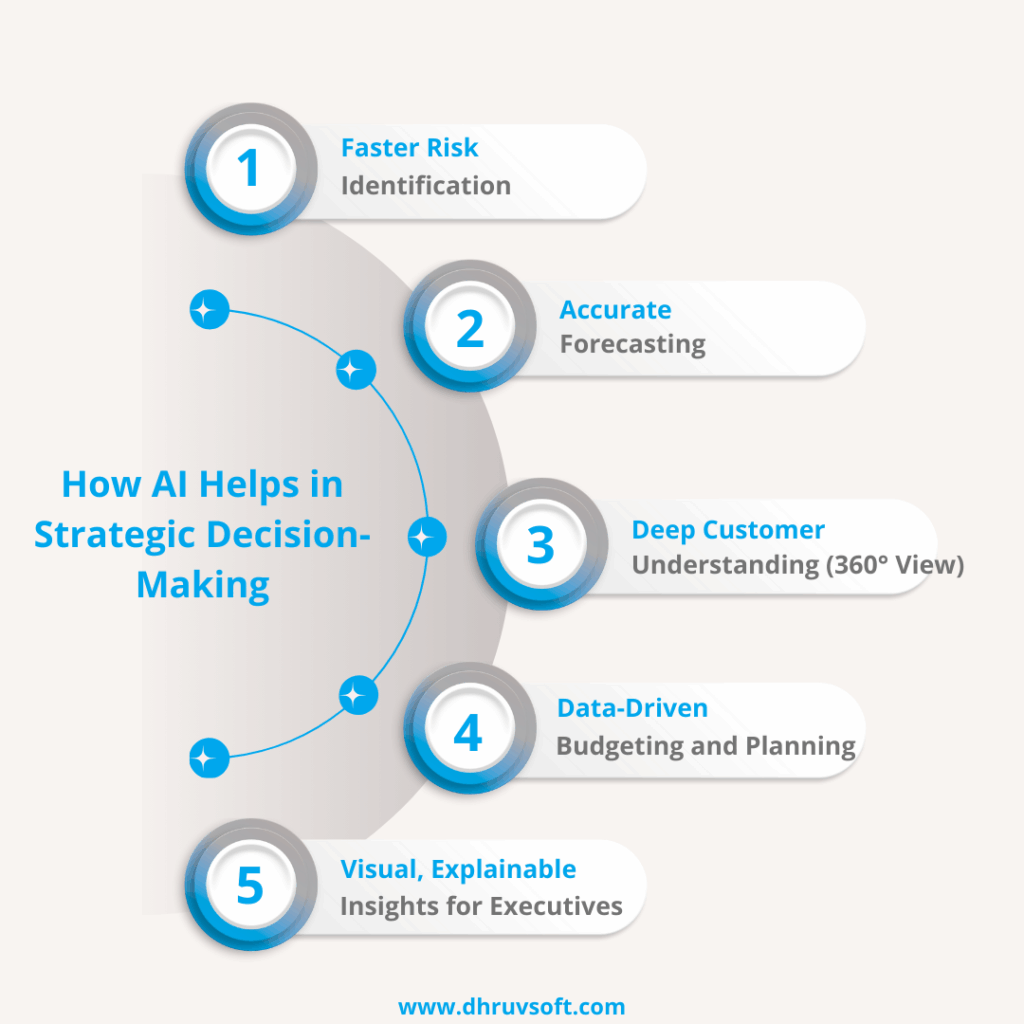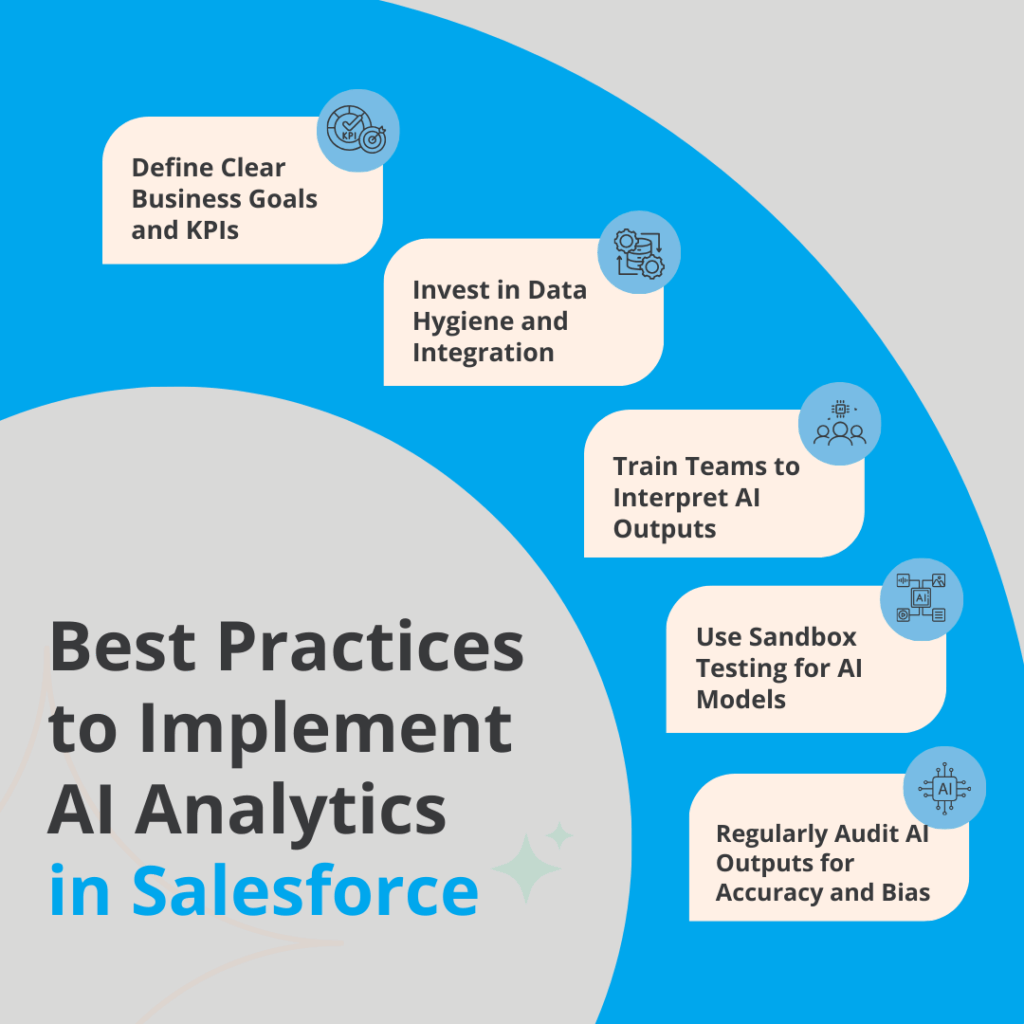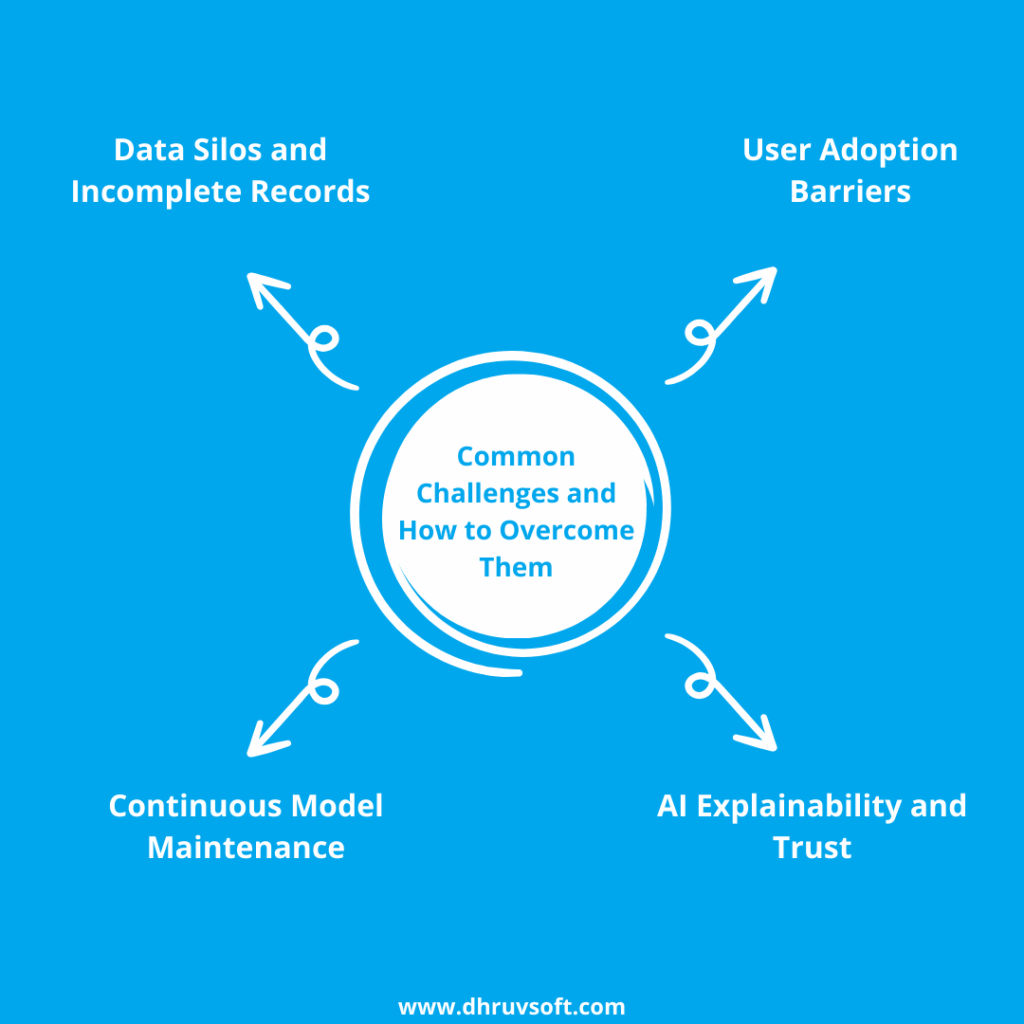In today’s fast-paced business environment, companies are under immense pressure to make quick, accurate, and strategic decisions. Traditional intuition-based approaches no longer suffice. Instead, businesses are shifting to data-driven strategies powered by Artificial Intelligence (AI) and advanced analytics. Among the tools leading this transformation, Salesforce has emerged as a powerful AI-enabled platform. With embedded intelligence tools like Einstein AI and Tableau CRM, Salesforce empowers businesses to predict outcomes, uncover opportunities, and streamline operations.
This blog post explores how Salesforce leverages AI and analytics to support strategic decision-making across different business functions. From sales forecasting to customer engagement, and from operational efficiency to innovation, Salesforce provides a comprehensive ecosystem to guide smarter, faster decisions. Let’s dive into how these AI-driven tools make that possible.

Why Data-Driven Decision-Making Is a Business Priority
Businesses operate in an era of constant change. Economic fluctuations, shifting customer expectations, and growing competition demand more accurate, data-backed decisions. Relying on gut feelings or outdated reports no longer works.
Adopting data-driven decision-making brings several benefits:
- Accuracy: Real-time, up-to-date data ensures better forecasting and planning.
- Efficiency: Insights allow teams to optimize resource allocation and processes.
- Risk Mitigation: Early detection of risks through data trends helps prevent costly mistakes.
- Customer-Centricity: Businesses can deliver personalized experiences based on behaviour and preferences.
By embedding data into every decision, companies build agility and resilience. Salesforce, through its integrated AI and analytics capabilities, becomes a key enabler of this transformation.
The Role of AI and Analytics in Modern Business Strategy
Artificial Intelligence and analytics act as the brains behind modern strategic planning. No longer reactive, businesses now use these tools to become proactive, anticipating challenges and identifying opportunities.
Key strategic roles played by AI and analytics include:
- Predictive Planning: Machine learning models forecast future trends and behaviours.
- Real-Time Optimization: AI algorithms adjust campaigns or operations instantly based on new data.
- Cross-Functional Integration: Unified data across departments leads to coordinated, strategic moves.
- Faster Decision-Making: Data visualisation and automation drastically reduce the time to decision.
In Salesforce, these capabilities are embedded across every cloud, allowing all business units to participate in data-driven growth.
Introduction to Salesforce as an AI-Powered Analytics Platform
Salesforce isn’t just a CRM platform – it’s an ecosystem built for intelligent business operations. At its core is a robust data model, layered with AI capabilities (Einstein) and advanced analytics tools (Tableau CRM).
Here’s how Salesforce stands out:
- Unified Data Model: Breaks down silos between departments, enabling 360° views.
- Built-in AI Layer: Predicts outcomes, automates tasks, and uncovers insights.
- Customizable Dashboards: Leaders can track KPIs specific to their roles.
- Scalable Architecture: From small teams to global enterprises, Salesforce adapts.
This foundation helps organizations align strategy with execution using one intelligent platform.
Understanding Einstein AI: Powering Predictive and Prescriptive Intelligence
Einstein AI is Salesforce’s built-in intelligence engine. It runs continuously in the background, learning from your business data and generating real-time insights. What sets Einstein apart is that it’s deeply integrated into every part of Salesforce, making it easy for users to take advantage of AI without any technical expertise.
Einstein in Action:
- Sales Cloud: Scores leads based on likelihood to convert, helps sales reps prioritise efforts, and forecasts revenue.
- Service Cloud: Suggests best responses for agents, predicts case escalation, and routes tickets to the right team.
- Marketing Cloud: Personalizes campaigns, forecasts engagement rates, and automates content delivery.
Key Einstein features:
- Einstein Lead Scoring: Uses historical data to score leads, so reps focus on high-converting opportunities.
- Einstein Forecasting: Analyses sales trends, predicts outcomes, and highlights anomalies.
- Einstein Opportunity Insights: Identifies deals at risk and suggests next-best actions.
- Einstein Discovery: Performs automatic statistical analysis, explains predictions, and recommends improvements.
Einstein transforms raw data into clear, actionable insights, turning complex analysis into everyday decision support.
Using Tableau CRM for Deep Analytics
Tableau CRM is Salesforce’s analytics solution. It combines the visualisation power of Tableau with the CRM context of Salesforce.
Its capabilities include:
- Advanced Data Modelling: Connects Salesforce data with external sources for deeper analysis.
- Smart Dashboards: Real-time visualisations that are interactive and role-specific.
- Predictive Storytelling: Users can build “stories” that forecast future outcomes.
- Custom Apps: Leaders can create tailored analytics apps for marketing, sales, or service teams.
Tableau CRM empowers every role in the organization to explore data, discover insights, and take timely actions, all within Salesforce.
Use Cases of AI and Analytics in Salesforce
Sales Performance Optimization
AI helps sales teams close more deals by providing timely insights. Pipeline analytics help sales leaders identify potential bottlenecks, track deal progression, and measure rep productivity.
- Pipeline Analysis and Forecasting: Know which deals are most likely to close and when.
- AI-Recommended Actions: Einstein suggests the next best step to advance or rescue a deal.
- Territory Performance Tracking: Compare quota attainment and productivity across teams and regions.
Marketing Campaign Intelligence
AI transforms marketing into a precision operation. Predictive analytics support audience targeting, campaign performance tracking, and lead-nurturing strategies.
- Attribution Modelling: Understand which channels and messages convert best.
- Churn Prediction: Identify at-risk leads and re-engage them before it’s too late.
- Behavioural Segmentation: Target customers based on purchase intent and engagement data.
Customer Service Enhancement
Customer expectations are high, and service must be smart. AI in Service Cloud empowers support teams to deliver faster, more personalized care.
- Case Deflection: AI chatbots handle common issues, reducing agent load.
- High-Risk Customer Alerts: Predict and escalate issues that require urgent attention.
- Agent Performance Insights: Optimize staffing, workflows, and resolution times.
Financial and Operational Planning
Accurate planning relies on strong data. Salesforce AI supports finance leaders with foresight into revenue, costs, and strategic investment returns.
- Revenue Forecasting: Build projections based on historical data and pipeline health.
- Budget Alignment: Match spending with performance trends and evolving goals.
- Cost-Benefit Analysis: Measure ROI for campaigns, projects, or resources.
Product Development and Innovation
Product decisions must be data-driven to succeed in a competitive market. Salesforce analytics helps product teams tap into customer needs and predict market success.
- Voice of the Customer: Aggregate feedback across channels to detect patterns.
- Adoption and Retention Metrics: Forecast how features are likely to perform.
- Impact-Based Prioritization: Rank features and innovations by business value.
Partner and Channel Performance Management
Channel strategy becomes smarter with AI insights. Businesses can track partner success and identify opportunities to optimize collaboration.
- Reseller and Distributor Analytics: Monitor sales, marketing, and service performance.
- High-ROI Channel Identification: Focus investment on the most effective partners.
- Predictive Recommendations: Suggest changes to product bundling or pricing by partner segment.
HR and Workforce Planning
People analytics helps HR teams make data-backed decisions about hiring, retention, and productivity.
- Attrition Forecasting: Identify patterns that lead to employee churn.
- Productivity Gaps: Detect where teams or departments are underperforming.
- Recruitment Funnel Optimization: Improve talent pipelines by analysing success rates.
How AI Helps in Strategic Decision-Making
Making strategic decisions is one of the most critical responsibilities of business leaders. These decisions affect company direction, resource allocation, and long-term goals. However, making such choices is risky without the right data. That’s where AI in Salesforce proves its worth by transforming complex datasets into clear, actionable insights.
Here’s how AI supports strategic decision-making in Salesforce:
Faster Risk Identification
AI systems in Salesforce, such as Einstein Discovery, continuously monitor data patterns. If something unusual occurs, like a drop in customer engagement, a spike in complaints, or delayed deals, AI can raise red flags early. This proactive alerting allows leaders to fix problems before they impact performance.
Accurate Forecasting
Strategic planning depends on understanding future trends. With tools like Einstein Forecasting, Salesforce helps business leaders predict:
- Revenue trends
- Sales closures
- Customer churn
- Product adoption
These forecasts help in planning investments, hiring, marketing spends, and inventory management.
Deep Customer Understanding (360° View)
AI analyses interactions across marketing, sales, service, and support channels to create a 360-degree customer profile. Leaders can see what customers want, how they behave, what frustrates them, and what keeps them loyal. This helps in shaping customer-first strategies that build long-term relationships.
Data-Driven Budgeting and Planning
Rather than relying on gut feeling, companies can use AI to understand past performance and allocate resources to high-ROI activities. For example, if certain marketing campaigns always underperform, AI can highlight them and suggest better alternatives.
Visual, Explainable Insights for Executives
AI in Salesforce doesn’t just provide numbers. It explains why a trend is happening and how to respond. This transparency builds trust in AI and gives board members and executives confidence in the insights they use to guide their strategies.
Best Practices to Implement AI Analytics in Salesforce
Implementing AI analytics in Salesforce isn’t about flipping a switch; it requires careful planning. To get meaningful results and avoid common pitfalls, organizations must follow a set of best practices. Here’s how to do it right:
Define Clear Business Goals and KPIs
Before jumping into dashboards or models, first ask:
- What problem are we solving?
- What key decisions do we want to improve?
- What does success look like?
These questions help define clear Key Performance Indicators (KPIs) that align your AI initiatives with business outcomes.
Invest in Data Hygiene and Integration
AI only works well if the data is clean, complete, and consistent. That means:
- Removing duplicates
- Filling in missing fields
- Standardizing formats
- Connecting siloed systems (ERP, marketing, service tools)
When your data foundation is strong, AI recommendations become reliable and actionable.
Train Teams to Interpret AI Outputs
Even the best AI tools are useless if users don’t trust or understand them. Invest in user education, showing team members:
- What each metric means
- How to read AI insights
- How to use dashboards for everyday decisions
This builds confidence and encourages adoption.
Use Sandbox Testing for AI Models
Before launching AI recommendations to your full team, test them in a sandbox environment. This allows your analysts or admins to:
- Validate model accuracy
- Refine thresholds
- Fix any errors or false predictions
It’s better to discover problems during testing than in live operations.
Regularly Audit AI Outputs for Accuracy and Bias
AI models must regularly be reviewed to ensure they:
- Remain accurate as business conditions evolve
- Are free from hidden biases (e.g., prioritising certain regions or genders unfairly)
- Continue adding business value
Salesforce provides tools for monitoring model health, so make auditing part of your AI governance plan.
Common Challenges and How to Overcome Them
While AI in Salesforce offers big rewards, it’s not without hurdles. Many businesses face roadblocks during implementation, but the good news is, they can be solved with the right approach.
Data Silos and Incomplete Records
Challenge: Sales, marketing, finance, and service teams often use separate tools. This creates fragmented data.
Solution: Use Salesforce integrations and tools like MuleSoft or Data Cloud to unify data from multiple systems. Clean and sync it regularly for complete, up-to-date insights.
User Adoption Barriers
Challenge: Employees might ignore AI insights because they don’t trust them or feel they add complexity.
Solution: Involve end-users early in the setup process. Use change management tactics like workshops, real-life examples, and step-by-step training to show how AI makes their work easier, not harder.
AI Explainability and Trust
Challenge: If the AI gives a recommendation but users don’t know why, they may reject it.
Solution: Use Einstein Discovery and Explainable AI tools to provide reasons behind each prediction. Add tooltips and pop-ups that explain the logic, not just the result.
Continuous Model Maintenance
Challenge: AI models can become outdated as markets shift or products change.
Solution: Set up a regular review schedule. Refresh models with the latest data and tweak them based on feedback. Use feedback loops to improve accuracy over time.
Future Trends in AI and Analytics within Salesforce
Salesforce continues to evolve with cutting-edge technology. Over the next few years, we can expect new AI-driven capabilities that push the boundaries of what’s possible in CRM analytics. Here are the most promising trends:
AI Copilots and Conversational Interfaces
Salesforce is introducing AI copilots (like Salesforce Einstein Copilot), which act like virtual assistants inside the platform. Users can:
- Ask questions in plain English
- Get quick insights without building reports
- Receive recommendations during live calls or emails
This makes AI more interactive and accessible to everyone.
Prescriptive Over Predictive Analytics
Right now, most AI systems tell you what will happen. But the future is prescriptive AI systems that also tell you what you should do.
Example:
- Predictive: “This customer might churn.”
- Prescriptive: “Offer this discount in the next three days to retain them.”
Salesforce is building more guided workflows and next-best-action engines to support this shift.
Autonomous Decision Suggestions
Salesforce AI will increasingly move toward automation with minimal human input, where the system can suggest or even take simple decisions on its own, like:
- Reassigning leads based on behaviour
- Adjusting campaign budgets in real time
- Prioritizing support cases without manual tagging
This frees up time and improves efficiency.
Deeper Tableau + Salesforce Integration
Expect tighter integration between Tableau, Tableau CRM, and Salesforce. Soon, you’ll be able to:
- Drag and drop Salesforce data into Tableau stories
- Create unified dashboards with external ERP, HR, and marketing tools
- Embed advanced visualisations into Salesforce pages
This helps leaders gain a complete view of their business at a glance.
Real-Time Streaming Analytics with Data Cloud
With Salesforce Data Cloud, businesses can now stream data in real time from multiple sources, including website visits, mobile apps, email campaigns, and more, into the CRM. AI can analyse it instantly to:
- Trigger automated actions
- Personalize messages on the fly
- Update forecasts in real time
This capability brings speed and agility to data-driven decisions like never before.
The Role of Strategic Partners and Consultants
While Salesforce provides powerful tools, implementation and optimization require expert knowledge. That’s where strategic partners like Dhruvsoft come in, certified Salesforce experts who specialise in maximising the value of AI and analytics within the CRM ecosystem.
Why Work with Certified Partners like Dhruvsoft?
- Faster Setup: Get your Salesforce environment up and running without unnecessary delays. Dhruvsoft uses proven frameworks and methodologies to ensure efficient and smooth deployment.
- Best Practices: Benefit from Dhruvsoft’s years of industry experience implementing Salesforce across various domains, real estate, finance, manufacturing, service industries, and more.
- Change Management: Transitioning to AI-driven tools can be overwhelming. Dhruvsoft helps your teams adapt confidently by offering structured change management support, training, and onboarding processes.
- Ongoing Support: Technology is always evolving. Dhruvsoft provides continuous support and system updates to ensure your AI models, dashboards, and analytics workflows stay accurate and relevant.
By partnering with Dhruvsoft, you gain a trusted advisor who ensures that your Salesforce investment delivers measurable outcomes. From implementation to ongoing optimization, Dhruvsoft ensures that technology aligns with business goals, empowering your team to make data-driven decisions with confidence.
Conclusion
Salesforce AI and analytics are no longer optional; they’re essential for modern decision-making. From better forecasting and improved marketing to smarter service and workforce planning, Salesforce brings everything into one intelligent system.
By adopting AI and using data strategically, your business will make decisions faster, reduce risk, and stay ahead of the competition.
Ready to turn data into a strategic advantage? Speak to our Salesforce-certified specialists at Dhruvsoft and see how AI and analytics can transform your business.


